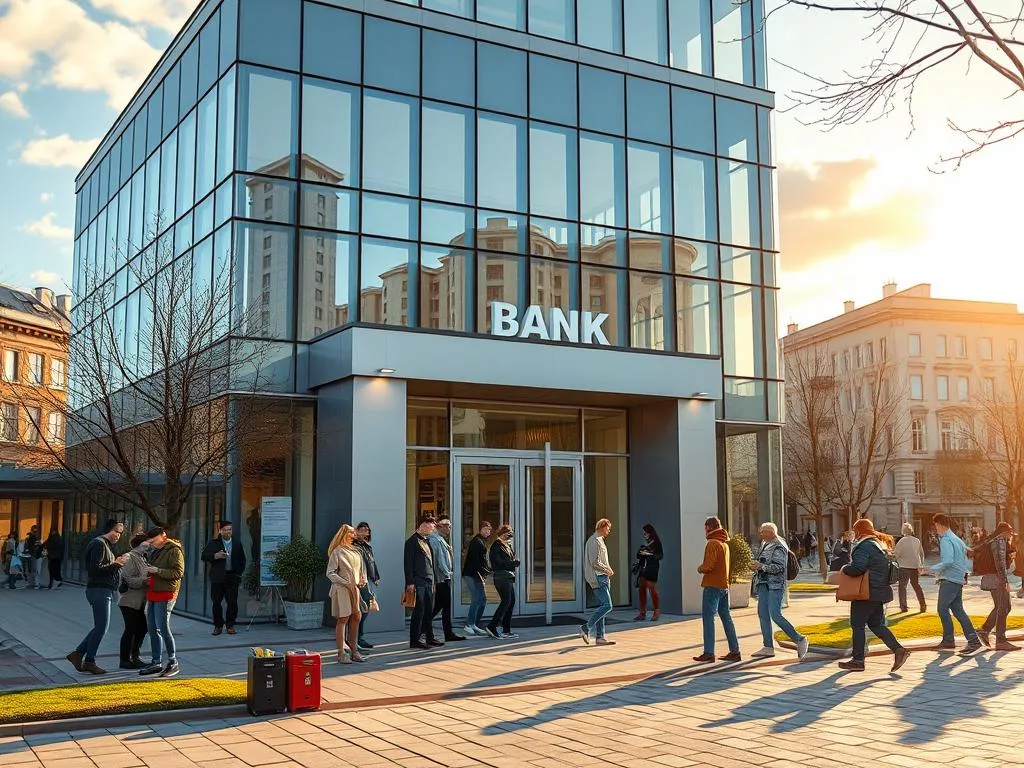Opening a bank account in Germany is a big step for non-resident foreigners. It helps them fit in with daily life. They need it for things like getting paid and paying bills. Most transactions also need cash, making a local bank account very important.
Germany’s banking system is divided into three main parts: private, public, and cooperative banks. Big names like Deutsche Bank and Commerzbank help expats. Digital banks like N26 and bunq also offer great options for newcomers. Knowing these options is key for a smooth financial transition.
If you’re looking for more info on banking for foreigners, check out this useful guide. Learning how to open your account is essential for living in Germany well.
Understanding the Importance of a Bank Account in Germany
A bank account is key for managing money in Germany. It’s even more important for expats. They can easily get paid, pay rent, and set up automatic payments for bills and insurance. Plus, they save money by avoiding high fees on foreign transactions.
In Germany, many places prefer cash. This makes having a local account for local payments very useful. Switching to a German account can make life easier and cheaper for expats.
Opening a bank account in Germany makes moving there easier. Some banks give you up to 90 days to show your residence permit after opening your account. This helps newcomers settle in without stress. Online banking is great for expats, with easy-to-use services and English support.
But, traditional German banks might be harder to deal with. They might ask for more and speak less English. Maestro cards are good for shopping in stores, while Mastercard is better for online shopping. American Express is not as common, so it’s smart to have other ways to pay.
For international banking, like getting money or setting up automatic payments, you need an IBAN. A local account with the right IBAN makes these tasks easier in Germany. For more on opening a bank account, check out this source.

Guide to Opening a Bank Account in Germany for Non-Resident Foreigners
Opening a bank account as a non-resident can seem daunting. But with the right information, it’s achievable. This guide aims to simplify the process for foreigners. Knowing the types of accounts available is key.
Consider a Girokonto (current account), Sparkonto (savings account with limited access), and Tagesgeldkonto (savings with instant access). Each suits different financial needs and preferences.
Many non-residents overlook the importance of choosing the right bank. Larger banks offer more resources for foreign clients. Online banking platforms provide user-friendly experiences. Researching the German banking system helps find the best options.
Familiarizing yourself with essential banking terms in German makes communication easier. Most banks require appointments for account openings. Prepare to present a valid passport and, in some cases, a residence permit.
Certain banks, like bunq | bank of The Free, allow up to 90 days to provide a residence permit after opening your account. Understanding these details streamlines your journey toward securing a non-resident account.
Many non-residents prefer online banking for its accessibility before arriving in Germany. This ensures immediate access to funds when relocating. Popular choices among expats include N26 and Tomorrow bank, both of which offer features tailored for international clients.

Payment card options also vary in Germany. Maestro cards are broadly accepted for in-store purchases, while Mastercard is favored for online transactions. American Express cards hold less acceptance and may limit some transactions. Understanding these payment methods is vital for successful expat banking.
| Bank Account Type | Monthly Fee (€) | Foreign Transaction Fee (%) |
|---|---|---|
| N26 Standard | 0 | 1.7 |
| DKB Checking Account | 0 | 0 |
| ING Checking Account | 0 | 1.99 |
| Commerzbank Account Basic | 118.80 | 6.98 |
| Santander BestGiro | 0 | 1.5 |
The IBAN (International Bank Account Number) system is key for various financial transactions. It’s used for international payments, setting up direct debits, and transferring funds across borders. Awareness of these processes will help you navigate the complexities of expat banking in Germany.
Required Documents for Opening a Bank Account
Non-residents in Germany need certain documents to open a bank account. Each bank has its own rules, but some documents are always needed. These help make opening an account easier.
- Valid Passport or ID: This proves who you are.
- Visa or Residence Permit: It shows you’re legally in Germany.
- Proof of Address (Anmeldebestätigung): This is from your registration when you moved.
- Tax Number (SteuerID): Some banks want this after you register your address.
- Proof of Employment or Income: Banks might ask for this to check your finances.
Having the right documents ready can avoid delays. Non-residents in Germany should contact their chosen banks early. This way, they know exactly what they need before they go. Banks like Deutsche Bank and Commerzbank offer special accounts for non-residents. This makes banking easier. For more details, check out this guide.
Steps to Open Your Bank Account in Germany
Start by looking into different banks in Germany. There are almost 1,500 banks to choose from. Think about what you need, like account types, fees, and customer support for English speakers.
Big banks like Deutsche Bank and Commerzbank have many account options. Neobanks like N26 and Comdirect are great for those who like digital banking.
Once you pick a bank, get the documents you need. These usually include ID, proof of where you live, and a work permit if you’re from outside the EU. Then, make an appointment at the bank. This helps make the application process easier.
At your meeting, show your documents to a bank staff member. They will help you fill out the application form. After that, there might be a verification process that takes some time.
Once you’re approved, you’ll get your account details. This includes your IBAN and access to online banking. Some banks can open accounts right away, thanks to online banking’s growing popularity. Knowing how to open a bank account step by step can make it much easier.

